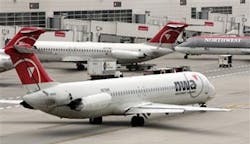NWA Flight Attendants Nix Contract
Northwest Airlines Corp. remains at contract loggerheads with its flight attendants union, an impasse that could lead to random work actions against the carrier and complicate its bankruptcy reorganization.
Northwest said a strike - which could spook travelers and send them to rival airlines - would be illegal and that it would seek a court order to block one. The Association of Flight Attendants pledged to give 15 days' notice before any strike.
The sparring came Monday after the airline's 9,300 flight attendants rejected a wage-cutting contract.
Northwest has sought $1.4 billion in annual labor savings as it reorganizes under Chapter 11 of the bankruptcy code. Flight attendants are the last union at Eagan-based Northwest, the nation's fifth-largest carrier by the standard industry measure, without a wage-cutting contract. But the airline's deals with pilots and ground workers don't take effect until there's a new contract for flight attendants, too.
Northwest moved quickly to impose a new contract after 55 percent of flight attendants voted down the tentative agreement. Flight attendants had rejected a slightly different tentative pact in June.
"People are angry," said Mollie Reiley, interim president of the union's Northwest branch, which had recommended passage of the tentative agreement.
"This is about justice. When you're making 28, 29, 30 thousand dollars a year and you're being asked to take close to a 40 percent cut in wages, benefits, overrides, et cetera, people can't afford it. They're going to lose their homes. They won't be able to afford to stay. I think a lot of our people just said, enough's enough."
The union said the imposition of those terms would be its trigger for what it calls CHAOS, for Create Havoc Around Our System. The union has described the tactic as using random, unannounced strikes on certain flights or certain gates.
It's a way to disrupt a carrier without gambling on shutting down the entire airline - a gamble flight attendants might lose.
Before Monday, Northwest already had permission from a bankruptcy judge to impose the terms of an earlier tentative agreement that 80 percent of flight attendants rejected in June. Northwest has been seeking worker pay cuts since 2003, and on Monday it said time was up.
Its new agreements with pilots and ground workers cannot take effect until it has a new contract with flight attendants, too - either one that workers approve, or one the company imposes on them.
On Monday night the union asked a bankruptcy judge to limit Northwest to imposing the terms rejected on Monday, rather than the terms rejected in June. Both would save Northwest $195 million a year, and both include pay cuts of roughly 21 percent. The union said the reduction amounted to 40 percent once health care costs and other givebacks were factored in.
The union has said it has a list of flight attendants who have volunteered to conduct limited strikes against the airline. But Bradley Bartholomew of The Newfoundland Group, which does airline labor consulting, questioned whether job actions by the union would do anything more than start a test case in the courts.
"It certainly could impact the schedule for a day or two," he said. "The actual impact would probably be minimal, because it would immediately be enjoined then move into the court system, and then be there for years."
A flight attendants walkout would be Northwest's second strike in less than a year. Mechanics struck in August 2005 rather than accept pay cuts. Northwest hired replacement workers and sent the work to outside contractors. Before that, the last major airline strike was Northwest pilots in 1998.
"When you had poor relationships to start with, and you had financial stress, and the reputation they had, I suppose this isn't a surprise," he said. "But it's certainly a sad ending."
News stories provided by third parties are not edited by "Site Publication" staff. For suggestions and comments, please click the Contact link at the bottom of this page.

